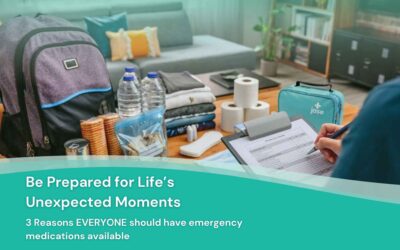When Disaster Strikes, It’s Not Hunger or Thirst That Takes the First Lives In every disaster zone, from hurricanes in the Caribbean to war zones in Ukraine, the pattern is the same. People worry about food and water, but it’s infection that kills first. A small wound...
FAQ: Our most commonly asked questions about Jase
If you’re considering Jase, chances are you’ve paused and thought, “This makes sense, but I still have a few questions.”You’re not alone. Here are the most common ones we hear, answered plainly.
Is this really doctor-prescribed?
Yes. Every Jase order is reviewed by a licensed physician. When approved, medications are prescribed specifically for you and dispensed by a licensed pharmacy. It’s proper medical care, delivered differently.
When would I actually use these medications?
Jase is designed for moments when care is hard to access. Travel, weekends, holidays, natural disasters, pharmacy closures, insurance issues, or being far from your usual provider. Most people hope they never need them, but are relieved when they do.
How long do the medications last? Are antibiotics safe to keep on hand?
Most medications in the JaseCase have shelf lives measured in years, not months. When prescribed by a physician and used appropriately, antibiotics are safe to keep on hand. Each medication includes clear guidance on when and how to use it. Medication expiration dates do not indicate a time when they become dangerous, but instead when they become less potent.
- Check expiration dates every six months.
- Store in a cool, dry place, heat and moisture degrade medicines.
- Keep backup doses for chronic conditions. Check out JaseDaily to get a backup supply today.
- Log your medications: what you have, when to reorder, and who they’re for.
Remember: expired medications may lose potency but rarely become toxic. Having something is better than nothing when supply chains fail.
Do I have to be a “prepper” to need this?
Not at all. Jase is about having a backup. Just like a spare tire or a first aid kit, it is there for peace of mind, not panic. If you keep extra batteries, shelf-stable food items, or toilet paper, then you know how important it is to prepare.
What if I don’t know which medication to use or take the wrong one?
Every JaseCase includes the MedDeck, a simple plain language instruction manual for each medication, explaining what it is for and how to take it. Because everything is prescribed specifically for you, there is no sorting through unsafe or unfamiliar options. We also encourage, whenever possible, to work with your doctor before taking any medications.
Is this worth the money if I already have insurance?
Insurance works well until it is unavailable when you need it. Jase does not replace insurance. It fills the gaps insurance cannot. Many customers see Jase as an investment in peace of mind, not a recurring expense.
Prepared does not mean paranoid. It means ready.
That is what Jase is here for.
Lifesaving Solutions
Everyone should be empowered to care for themselves and their loved ones during the unexpected. Check out our recent lifesaving products today.
Recent Posts
Keeping you informed and safe.
Medical Readiness: What Really Kills First
Exploring Dr. William Makis’ Hybrid Orthomolecular Cancer Protocol: Focus on Ivermectin and Mebendazole/Fenbendazole
Exploring Dr. William Makis’ Hybrid Orthomolecular Cancer Protocol: Focus on Ivermectin and Mebendazole/Fenbendazole *Disclaimer: This article is for educational purposes and does not constitute medical advice. Always seek professional guidance.* In the evolving...
Be Prepared for Life’s Unexpected Moments
3 Reasons EVERYONE should have emergency medications avaiable. It's all about access—access to medications and care when you need it most. And when things happen outside of your control that access can disappear.Below are 3 examples of how easily this access can be...
Youth Preparedness: Teaching, Building, and Coping with Disasters
Educating and preparing your children ahead of time means fewer surprises in the event of an emergency.Growing Up Prepared: Empowering Youth in Disaster Preparedness As we observe National Preparedness Month, it's crucial to remember that disasters can strike at any...












